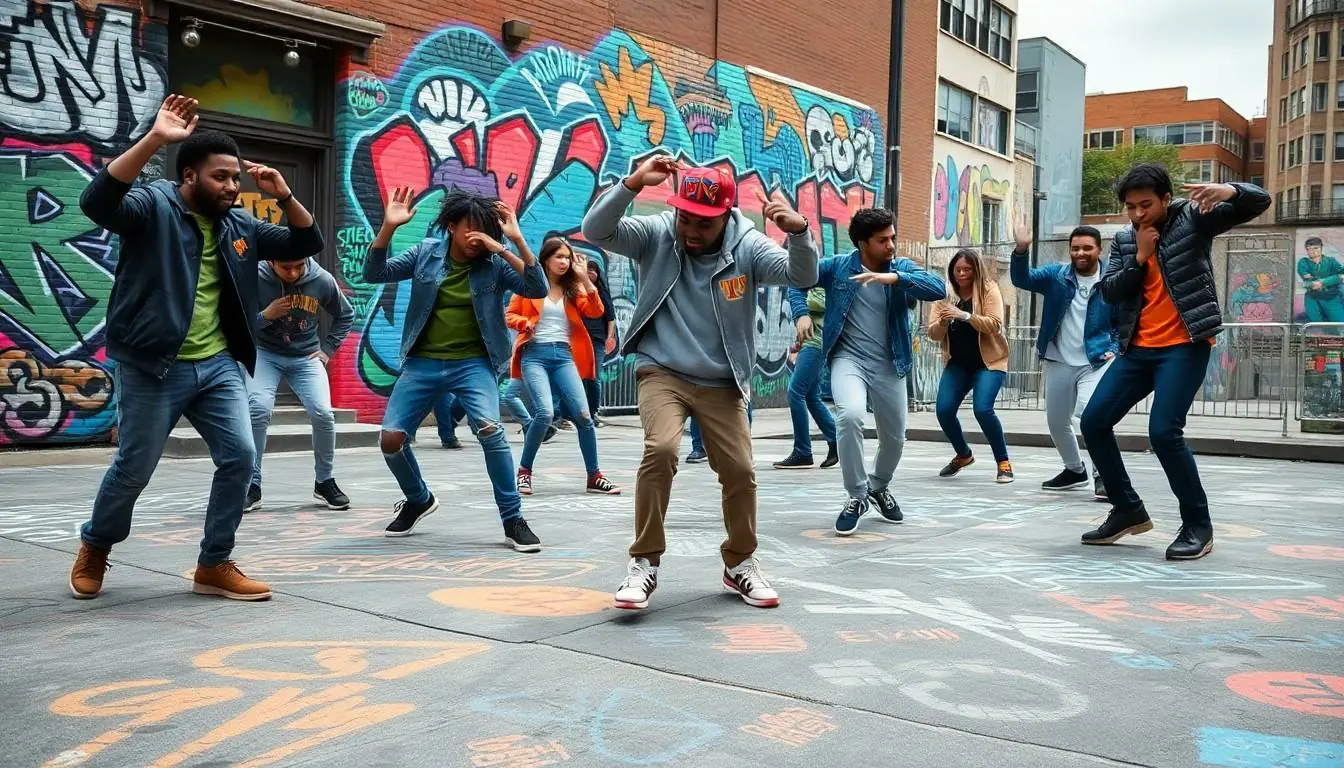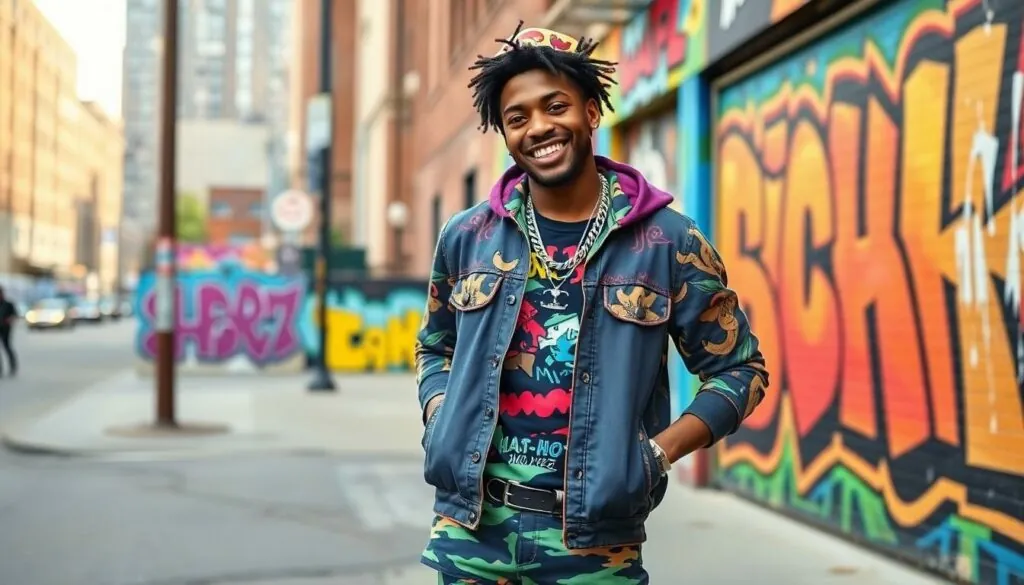Table of Contents
ToggleHip hop isn’t just a genre; it’s a cultural movement that brings rhythm and poetry to life. Those catchy “hip hop hippity hop” lyrics have a way of sticking in your head like that last slice of pizza you just can’t resist. Whether you’re busting a move in your living room or spitting bars at a party, these lyrics capture the essence of fun and creativity in the most entertaining way possible.
Overview of Hip Hop Hippity Hop Lyrics
Hip hop hippity hop lyrics reflect a vibrant cultural expression that resonates with listeners. They often incorporate elements of storytelling, social commentary, and playful wordplay. Rhythm and meter play crucial roles in delivering catchy phrases, creating a musical experience that sticks in the mind.
Creativity shines through in the lyrics, with artists using diverse vocabulary and inventive rhymes. Expressive themes, including empowerment, resilience, and celebration, dominate many songs. Imagery and metaphors enrich the lyrical content, allowing audiences to visualize the emotions conveyed.
Danceability factors heavily into the appeal of hip hop lyrics. They inspire movement and encourage participation, whether on the dance floor or at home. Performances often enhance the experience, with artists engaging the crowd through repetitive hooks and call-and-response formats.
Collaboration within the hip hop community further amplifies the lyrics’ reach. Featuring guest artists creates a blend of styles and perspectives, enriching the lyrical landscape. This collaboration fosters a sense of connection among listeners and artists alike.
Overall, hip hop hippity hop lyrics capture the essence of the genre’s cultural significance. The infectious nature of these lyrics has made them a staple in music, ensuring their legacy within various social contexts.
Historical Context

Hip hop’s evolution reflects its roots as a powerful cultural movement. Through music, dance, and visual art, it embodies social expressions that resonate across communities and generations.
Origins of Hip Hop Culture
Originating in the 1970s in the Bronx, hip hop culture emerged as a response to urban challenges. DJs played crucial roles, mixing and sampling tracks that ignited block parties. The art of MCing developed as vocalists engaged the crowd with rhythmic storytelling. Artists used these gatherings to address social issues like poverty and discrimination. Breakdancing and graffiti also flourished, adding visual and kinetic dimensions to the movement. Collectively, these elements created a vibrant platform for voices often marginalized by mainstream society.
Evolution of Lyricism in Hip Hop
Lyricism evolved as artists experimented with wordplay and storytelling techniques. Early hip hop focused on party themes and personal experiences. As the genre matured, artists began to incorporate deeper social commentary and political messages. The 1990s introduced influential lyricists who pushed creative boundaries, blending complex rhymes and innovative metaphors. Today, lyricism encompasses various styles, reflecting diverse perspectives and cultural backgrounds. With each generation, hip hop continues to inspire and challenge listeners, reinforcing its significance in contemporary society.
Key Themes in Hip Hop Hippity Hop Lyrics
Hip hop lyrics often embody powerful themes, capturing the essence of cultural expression and social narrative.
Celebration of Life and Joy
Celebration permeates hip hop through exuberant lyrics that highlight joy and community. Artists create catchy hooks that evoke happiness, inviting listeners to dance and revel. The emphasis on good times connects individuals, fostering unity among diverse audiences. Parties and gatherings serve as backdrops for these vibrant expressions, making them relatable and uplifting. Rhythmic flows complement themes of triumph, encouraging people to embrace positivity despite challenges. This joyous portrayal contributes to hip hop’s enduring appeal, inviting everyone to join the celebration.
Social Commentary and Storytelling
Social issues resonate deeply within hip hop lyrics, framing the genre as a platform for storytelling. Artists often share personal experiences that reflect broader societal challenges, such as inequality and injustice. Powerful imagery and authentic narratives draw attention to these crucial topics, prompting listeners to engage with critical conversations. The evolution of lyricism showcases a blend of personal and collective stories, revealing diverse perspectives. Wordplay enhances the impact, making poignant messages memorable and impactful. As artists continue to explore these themes, hip hop remains a vital voice for change and awareness in society.
Influential Artists and Their Lyrics
Hip hop is shaped by artists who deliver powerful lyrics that resonate across generations. Their work continuously influences new artists and fans alike.
Classic Tracks That Define the Genre
Notable tracks like “Rapper’s Delight” by The Sugarhill Gang introduced hip hop to mainstream audiences, blending catchy hooks with rhythmic storytelling. Similarly, “The Message” by Grandmaster Flash and the Furious Five showcased the genre’s ability to address societal issues, using vivid imagery to convey experiences of urban life. Tracks like “Juicy” by The Notorious B.I.G. and “Fight the Power” by Public Enemy further solidified hip hop’s position as a platform for social commentary and empowerment. Classic songs embody essential elements of hip hop, from inventive rhymes to relatable themes that resonate with listeners.
Modern Interpretations and Innovations
Contemporary artists like Kendrick Lamar and J. Cole redefine hip hop through complex narratives and introspective lyrics. Tracks such as “Alright” highlight resilience amid adversity, merging personal experiences with broader societal critiques. Lil Nas X brings innovation by blending genres, as evidenced in “Old Town Road,” which challenges traditional boundaries within music. Collaborations across various styles enrich the genre further, allowing artists to experiment with sounds and elevate their messages. Modern lyricism embodies a fusion of tradition and innovation, ensuring hip hop continues to evolve while remaining rooted in its cultural significance.
Impact on Popular Culture
Hip hop lyrics significantly shape popular culture, influencing fashion, language, and social movements. Artists often use their platforms to address pressing issues like inequality and discrimination, fostering awareness and change. Community events, such as block parties, highlight the genre’s ability to unite people through shared experiences and rhythms.
Diverse elements within hip hop encourage creative expressions across various mediums. Visual arts, including graffiti and street murals, often feature themes explored in lyrics, enhancing cultural visibility. Dance styles, such as breakdancing and locking, also flourish in conjunction with hip hop music, further cementing its impact on movement and performance.
Cultural references in hip hop lyrics permeate mainstream media, appearing in movies, advertising, and television shows. This cross-pollination introduces new audiences to the genre, expanding its reach and appreciation. Fashion trends, too, often draw inspiration from hip hop artists, with streetwear brands rapidly evolving to reflect the culture’s dynamic nature.
Innovation within the genre continues to drive cultural conversations. Contemporary artists like Cardi B and Travis Scott challenge traditional norms, pushing boundaries with their unique styles and messages. Collaborations between hip hop and other genres, such as pop or rock, further illustrate its versatility and influence within popular music.
Listeners connect deeply with hip hop lyrics, as they resonate with personal and societal narratives. Through storytelling, artists create relatable experiences, invoking emotions and prompting critical reflection. Celebrating success and resilience in the lyrics, artists inspire their audience, reinforcing hip hop’s cultural relevance and lasting legacy.
Hip hop lyrics resonate deeply within the cultural landscape, serving as a powerful medium for expression and connection. Their ability to weave personal narratives with broader social themes creates a rich tapestry that invites listeners to engage and reflect.
As the genre evolves, it continues to inspire new generations of artists and fans alike. The innovative spirit of hip hop ensures that its messages of empowerment and resilience remain relevant.
Ultimately, hip hop lyrics embody a celebration of life and creativity, fostering unity through shared experiences and rhythms that transcend boundaries. Their impact on society and culture will undoubtedly endure, solidifying hip hop’s legacy for years to come.





